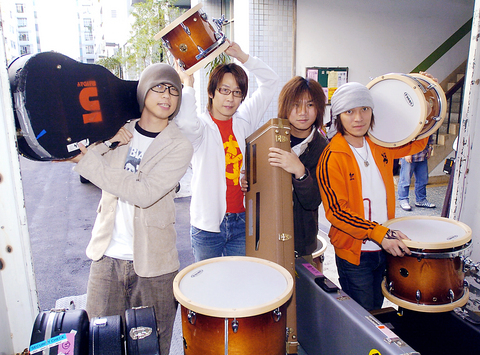If you notice an influx of teenage girls in the capital this weekend, you can thank Mayday (五月天), the punk rock pack-cum-pop idols that will be playing the Taipei Athletic tomorrow night.
A favorite of Taiwan's nascent rock scene in the mid to late-1990s, Mayday catapulted to fame following their Golden Melody nomination for Best Band in 2000. Though they lost the award that year, a contract they inked with Rock Records, the nation's largest label for rock music, gave them the marketing muscle they needed to start selling records on the same scale as perennially favorite pop stars like Lee Hom Wong (王力宏), Eason Chan (陳奕迅) and David Tao. They've since become one of Taiwan's only million-selling rock bands, behind Wu Bai and China Blue, and they've taken home their own Golden Melody awards for Best Band and Best Video and even had a Taipei City Honor award bestowed on them by Mayor Ma Ying-jeou (馬英九).

PHOTO: TAIPEI TIMES
But along with fame came a change in the style of the band's music. Songs that once had a harder edge to them softened, started fitting a more standard three-minute format and generally became more KTV-friendly. Their love ballad Chun-chiao and Chih-ming (春嬌與志明) was the No. 1 most-requested song in the nation's KTVs for over 50 weeks following their 2000 Golden Melody nod, according to their label.
Their lyrics now typically deal with love, where they once sang about teen angst and even gay rights -- a topic their music hasn't broached in recent years. Their more melodic pop sound has garnered them comparisons with the early Beatles -- one of Mayday's admitted idols. They even emulated the Fab Four's famous Apple Studios rooftop gig, playing a few songs atop EMI studios in downtown Taipei in December of 2003.
It was a far cry from their early gigs played in smoky Taipei pubs or in the fields of Spring Scream in the late 1990s, where they came up with bands like Sticky Rice (糯米團) and Luantan (亂彈). Some say the changes they've undergone over the past five years are tantamount to selling out, others dispute the charge. For their part, the band is now concerned with selling out in a much different meaning of the term.
In August of 2003, Mayday broke a Taiwan concert attendance record long held by Michael Jackson, surpassing the gloved-one's 40,000-ticket benchmark. Three months later, David Tao broke that record again by selling 50,000 tickets.
Reached by phone earlier this week, Mayday's publicity agent seemed confident the band would again get 40,000 fans into the house, but explained that it wouldn't be possible to get any more.
"We can't sell any more than 40,000 because that's the capacity of the Taipei Athletic Stadium," she said. "But I'm sure we'll sell out."
She suggested that anyone trying to get a ticket at the door arrive as early as possible. Alternatively, tickets are still being sold at the National Concert Hall (兩廳院), the only outlet which hasn't sold out. Nosebleed seats cost NT$500 and sitting front-row-center will set you back NT$1,500.
Performance notes:
What: Mayday concert
Where: The Taipei Athletic Stadium (
When: Tomorrow night, 7:30pm
Tickets: NT$500 to NT$1,500, at the door or at National Concert Hall (兩廳院)

Taiwan has next to no political engagement in Myanmar, either with the ruling military junta nor the dozens of armed groups who’ve in the last five years taken over around two-thirds of the nation’s territory in a sprawling, patchwork civil war. But early last month, the leader of one relatively minor Burmese revolutionary faction, General Nerdah Bomya, who is also an alleged war criminal, made a low key visit to Taipei, where he met with a member of President William Lai’s (賴清德) staff, a retired Taiwanese military official and several academics. “I feel like Taiwan is a good example of

March 2 to March 8 Gunfire rang out along the shore of the frontline island of Lieyu (烈嶼) on a foggy afternoon on March 7, 1987. By the time it was over, about 20 unarmed Vietnamese refugees — men, women, elderly and children — were dead. They were hastily buried, followed by decades of silence. Months later, opposition politicians and journalists tried to uncover what had happened, but conflicting accounts only deepened the confusion. One version suggested that government troops had mistakenly killed their own operatives attempting to return home from Vietnam. The military maintained that the

Before the last section of the round-the-island railway was electrified, one old blue train still chugged back and forth between Pingtung County’s Fangliao (枋寮) and Taitung (台東) stations once a day. It was so slow, was so hot (it had no air conditioning) and covered such a short distance, that the low fare still failed to attract many riders. This relic of the past was finally retired when the South Link Line was fully electrified on Dec. 23, 2020. A wave of nostalgia surrounded the termination of the Ordinary Train service, as these train carriages had been in use for decades

Lori Sepich smoked for years and sometimes skipped taking her blood pressure medicine. But she never thought she’d have a heart attack. The possibility “just wasn’t registering with me,” said the 64-year-old from Memphis, Tennessee, who suffered two of them 13 years apart. She’s far from alone. More than 60 million women in the US live with cardiovascular disease, which includes heart disease as well as stroke, heart failure and atrial fibrillation. And despite the myth that heart attacks mostly strike men, women are vulnerable too. Overall in the US, 1 in 5 women dies of cardiovascular disease each year, 37,000 of them